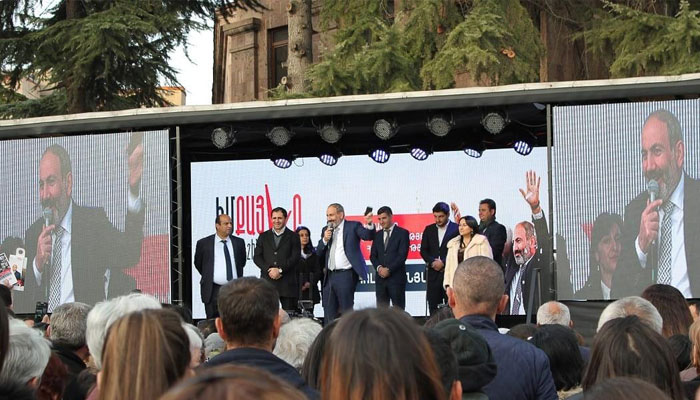Azerbaijan claims: Armenia’s mly-political leadership continues to commit acts of terrorism
ISTANBUL: Azerbaijan has claimed that the military-political leadership of Armenia continues to commit acts of terrorism against the civilian population, grossly violating the norms and principles of international law as 46 civilians have been hospitalised with various injuries, and 14 have been killed so far as a consequence of heavy artillery shelling of Azerbaijani densely populated areas.
Baku has said that in addition, Armenian military units continue to subject densely populated areas — regional and rural centers, civil infrastructure objects — hospitals, medical centers, school buildings, kindergartens, administrative buildings of public agencies and household premises areas to intensive artillery bombardment.
According to Azerbaijan Embassy, Azerbaijan spokesperson has announced that the Prosecutor General's Office of Azerbaijan is taking all necessary steps to ensure that servicemen of the Armenian armed forces who have committed various crimes are prosecuted and punished within the frames of international law.
Leyla Abdullayeva, Head of the Press Service Department of Azerbaijan, has denied allegations by some foreign media outlets that militants were deployed from Syria to Azerbaijan.
Azerbaijan has said in its Factsheet that the armed forces of Armenia have been continuing to target the civilian population, private houses and other civilian infrastructure in residential areas along the line of contact in a gross violation of its obligations under international humanitarian law, including the 1949 Geneva Conventions.
Electricity and energy infrastructure was damaged in the residential areas. Gas lines in the Borsunlu and Hulabandi villages, and several neighbourhoods in the administrative center of the Tartar district were targeted by armed units of Armenia.
Meanwhile, Armenian and Azerbaijani forces intensified their shelling Thursday despite fresh calls from world leaders for an end to days of fighting over the disputed Nagorno-Karabakh region that have left nearly 130 dead.
Police also deployed in large numbers in the streets of Stepanakert, the capital of the breakaway province, after two explosions, as drones buzzed overhead and sirens sounded during the night.
Armenian defence ministry spokesman Artsrun Hovhannisyan said fighting had "intensified" in the morning following fewer exchanges at night and that its troops had repelled Azerbaijani attacks. He claimed that Armenian forces inflicted "enormous losses" over the night and into the morning, killing 350-360 Azerbaijani troops, downing three helicopters and destroying 15 armoured vehicles as well as drones.
Azerbaijan’s defence ministry in turn said its forces had carried out "crushing artillery strikes against Armenian forces’ positions in the occupied territories" during the night.
It denied claims by Yerevan that one of its helicopters had been downed, crashing in Iran and said that fighters on the Armenian side had been "forced to retreat from previously held positions along the entire stretch of the frontline."
Russian President Vladimir Putin and his French counterpart Emmanuel Macron, in a telephone conversation late Wednesday, issued the most recent call for a complete halt to fighting in Karabakh and said they were ready to intensify diplomatic efforts to help resolve the conflict.
Armenia has recorded the deaths of 104 soldiers and eight civilians. Azerbaijan hasn’t reported any military casualties but said 17 civilians were killed as a result of Armenian shelling.
Meanwhile, Turkish President Recep Tayyip Erdogan said on Thursday that a ceasefire in Nagorno-Karabakh was only possible if Armenian-backed forces withdrew from the separatist region and the rest of Azerbaijan.
"The way for a lasting ceasefire in this region depends on Armenians’ withdrawal from every span of Azerbaijani territory," Erdogan said in a televised address. Erdogan spoke moments before the presidents of Russia, the United States and France jointly called for an "immediate cessation of hostilities" -- the worst since a war in the early 1990s killed 30,000 and left the region under separatist control.
-
 Savannah Guthrie Sends Desperate Plea To Mom Nancy Kidnapper
Savannah Guthrie Sends Desperate Plea To Mom Nancy Kidnapper -
 NBA All-Star 2026 Shake-up: Inside The New USA Vs World Tournament Format
NBA All-Star 2026 Shake-up: Inside The New USA Vs World Tournament Format -
 Warner Bros Consider Reopening Deal Talks With Paramount, Says Reports
Warner Bros Consider Reopening Deal Talks With Paramount, Says Reports -
 Andrew Mountbatten Windsor Faces Future With UK MPs, Says Expert
Andrew Mountbatten Windsor Faces Future With UK MPs, Says Expert -
 Shamed Andrew Told 'nobody Is Above The Law' Amid Harrowing Silence
Shamed Andrew Told 'nobody Is Above The Law' Amid Harrowing Silence -
 Gisele Bundchen Melts Hearts With Sweet Bike Ride Glimpse Featuring Son
Gisele Bundchen Melts Hearts With Sweet Bike Ride Glimpse Featuring Son -
 Prince William Found Meghan Markle ‘quite Refreshing’ At Start
Prince William Found Meghan Markle ‘quite Refreshing’ At Start -
 Kate Middleton Knew Should Could Not Be ‘voice Of Reason’ With Prince Harry
Kate Middleton Knew Should Could Not Be ‘voice Of Reason’ With Prince Harry -
 Rihanna Has Wardrobe Malfunction At A$AP Rocky Fashion Show
Rihanna Has Wardrobe Malfunction At A$AP Rocky Fashion Show -
 Prince Harry Felt System Had ‘one Rule For Him, One For Prince William’
Prince Harry Felt System Had ‘one Rule For Him, One For Prince William’ -
 Jake Paul's Fiancée Sends Him Over The Moon Over Stunning Victory
Jake Paul's Fiancée Sends Him Over The Moon Over Stunning Victory -
 Harper Beckham Sends Valentine’s Love Amid Brooklyn Family Drama
Harper Beckham Sends Valentine’s Love Amid Brooklyn Family Drama -
 Why Prince William, Kate Middleton 'partnership' Is Important For Monarchy
Why Prince William, Kate Middleton 'partnership' Is Important For Monarchy -
 Katie Price Drama Escalates As Family Stays In Touch With Ex JJ Slater
Katie Price Drama Escalates As Family Stays In Touch With Ex JJ Slater -
 Critics Target Palace Narrative After Andrew's Controversy Refuses To Die
Critics Target Palace Narrative After Andrew's Controversy Refuses To Die -
 Sarah Ferguson’s Delusions Take A Turn For The Worse: ‘She’s Been Deserted’
Sarah Ferguson’s Delusions Take A Turn For The Worse: ‘She’s Been Deserted’




